#data science and analytics courses
Explore tagged Tumblr posts
Text

Shape your future with Advanto Software's comprehensive training programs. Offering flexible learning, and industry-recognized certifications. Transform your career prospects today! contact us- 7276474342
#advanto software#software testing classes in pune#software testing training in pune#best software testing institute in pune#software testing courses in pune#data science and analytics courses#classes for data science#data science course in pune
0 notes
Text
Unlock Your Future: Data Science and Analytics Courses at M S Ramaiah University
M S Ramaiah University offers cutting-edge data science and analytics courses designed to equip students with essential skills for the digital age. Our comprehensive curriculum covers key topics such as machine learning, data visualization, and statistical analysis, ensuring a robust understanding of data-driven decision-making. With experienced faculty and hands-on projects, students gain practical insights, preparing them for successful careers in this rapidly evolving field. Join us to transform your future!
0 notes
Text

Data Analytics Course Online,Diploma In Data Analytics Online,Data Analytics Certification Courses In India,Data Analytics Courses For Beginners,Certificate In Data Analytics,Business Analytics Online Course,Data Science And Analytics Courses,Data Analytics Certification Online,Data Analytics Courses Near Me
#Data Analytics Course Online#Diploma In Data Analytics Online#Data Analytics Certification Courses In India#Data Analytics Courses For Beginners#Certificate In Data Analytics#Business Analytics Online Course#Data Science And Analytics Courses#Data Analytics Certification Online#Data Analytics Courses Near Me
0 notes
Text
youtube
How To Learn Math for Machine Learning FAST (Even With Zero Math Background)
I dropped out of high school and managed to became an Applied Scientist at Amazon by self-learning math (and other ML skills). In this video I'll show you exactly how I did it, sharing the resources and study techniques that worked for me, along with practical advice on what math you actually need (and don't need) to break into machine learning and data science.
#How To Learn Math for Machine Learning#machine learning#free education#education#youtube#technology#educate yourselves#educate yourself#tips and tricks#software engineering#data science#artificial intelligence#data analytics#data science course#math#mathematics#Youtube
22 notes
·
View notes
Text

Elevate Your Brand, Rule the Digital Space with Cybrom Technology.
#digital marketing#Social media marketing#Data science#data analytics#data analyst course#seo#search engine optimization#google ads
5 notes
·
View notes
Text
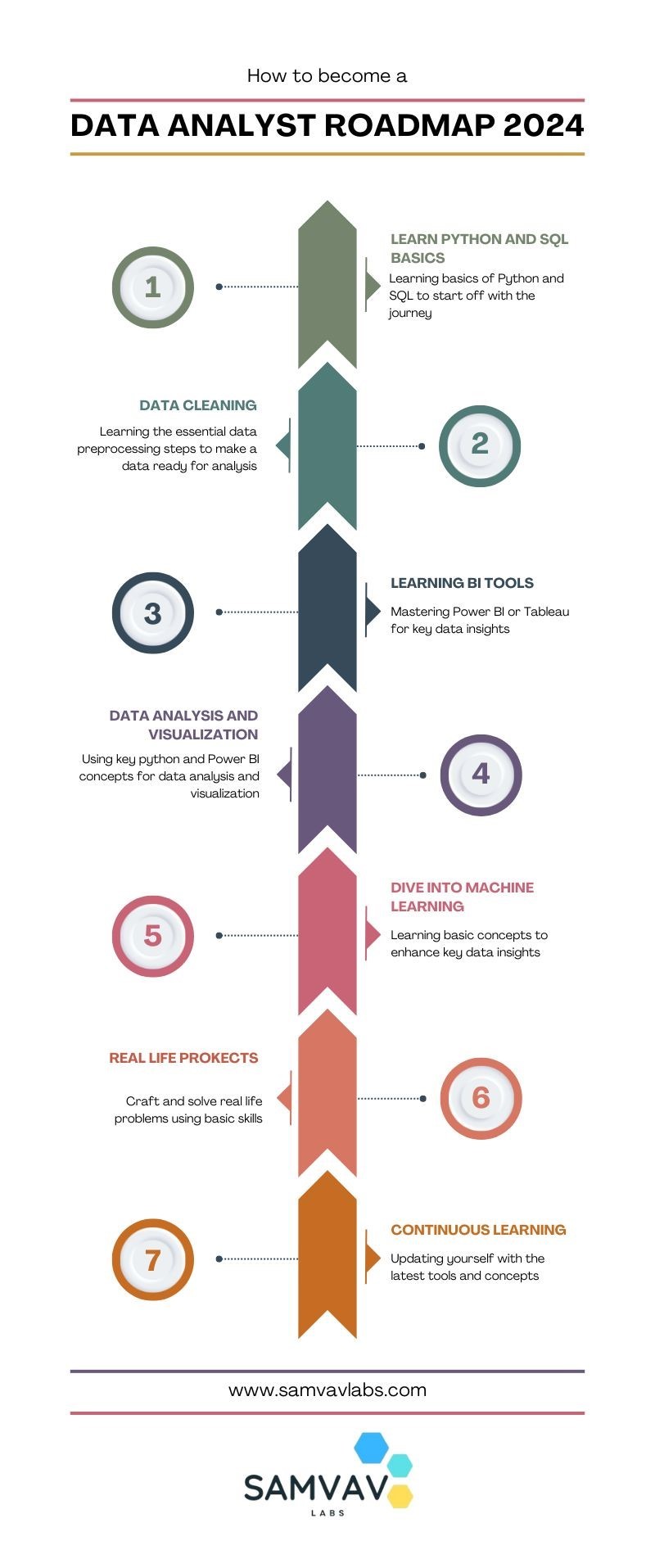
Data Analyst Roadmap for 2024!
Cracking the Data Analyst Roadmap for 2024! Kick off your journey by mastering and delving into Python for data manipulation magic, and dazzle stakeholders with insights using PowerBi or Tableau. Don't forget, that SQL proficiency and hands-on projects refine your skillset, but never overlook the importance of effective communication and problem-solving. Are you checking off these milestones on your path to success? 📌 For more details, visit our website: https://www.samvavlabs.com . . . #DataAnalyst2024 #CareerGrowth #roadmap #DataAnalyst #samvavlabs #roadmap2024 #dataanalystroadmap #datavisualization
#business analytics#data analytics#data analyst#machinelearning#data visualization#datascience#deep learning#data analyst training#dataanalystcourseinKolkata#data analyst certification#data analyst course#data science course#business analyst
9 notes
·
View notes
Text
What are some challenging concepts for beginners learning data science, such as statistics and machine learning?
Hi,
For beginners in data science, several concepts can be challenging due to their complexity and depth.
Here are some of the most common challenging concepts in statistics and machine learning:

Statistics:
Probability Distributions: Understanding different probability distributions (e.g., normal, binomial, Poisson) and their properties can be difficult. Knowing when and how to apply each distribution requires a deep understanding of their characteristics and applications.
Hypothesis Testing: Hypothesis testing involves formulating null and alternative hypotheses, selecting appropriate tests (e.g., t-tests, chi-square tests), and interpreting p-values. The concepts of statistical significance and Type I/Type II errors can be complex and require careful consideration.
Confidence Intervals: Calculating and interpreting confidence intervals for estimates involves understanding the trade-offs between precision and reliability. Beginners often struggle with the concept of confidence intervals and their implications for statistical inference.
Regression Analysis: Multiple regression analysis, including understanding coefficients, multicollinearity, and model assumptions, can be challenging. Interpreting regression results and diagnosing issues such as heteroscedasticity and autocorrelation require a solid grasp of statistical principles.
Machine Learning:
Bias-Variance Tradeoff: Balancing bias and variance to achieve a model that generalizes well to new data can be challenging. Understanding overfitting and underfitting, and how to use techniques like cross-validation to address these issues, requires careful analysis.
Feature Selection and Engineering: Selecting the most relevant features and engineering new ones can significantly impact model performance. Beginners often find it challenging to determine which features are important and how to transform raw data into useful features.
Algorithm Selection and Tuning: Choosing the appropriate machine learning algorithm for a given problem and tuning its hyperparameters can be complex. Each algorithm has its own strengths, limitations, and parameters that need to be optimized.
Model Evaluation Metrics: Understanding and selecting the right evaluation metrics (e.g., accuracy, precision, recall, F1 score) for different types of models and problems can be challenging.
Advanced Topics:
Deep Learning: Concepts such as neural networks, activation functions, backpropagation, and hyperparameter tuning in deep learning can be intricate. Understanding how deep learning models work and how to optimize them requires a solid foundation in both theoretical and practical aspects.
Dimensionality Reduction: Techniques like Principal Component Analysis (PCA) and t-Distributed Stochastic Neighbor Embedding (t-SNE) for reducing the number of features while retaining essential information can be difficult to grasp and apply effectively.
To overcome these challenges, beginners should focus on building a strong foundation in fundamental concepts through practical exercises, online courses, and hands-on projects. Seeking clarification from mentors or peers and engaging in data science communities can also provide valuable support and insights.
#bootcamp#data science course#datascience#data analytics#machinelearning#big data#ai#data privacy#python
3 notes
·
View notes
Text
Top Data Science Courses With Certificate ⬇️
1-IBM Data Science Professional Certificate
https://imp.i384100.net/YgYndj
2-Google Data Analytics Professional Certificate
https://imp.i384100.net/x9jAxk
3-Google Data Analytics Professional Certificate
https://imp.i384100.net/x9jAxk
4-Introduction to Data Science Specialization
https://imp.i384100.net/Ryqyry
5-Applied Data Science with Python Specialization
https://imp.i384100.net/GjkEPn
6-Google Advanced Data Analytics Professional Certificate
https://imp.i384100.net/1r5E3B
7-What is Data Science?
https://imp.i384100.net/JzmRaN
8-Data Science Specialization
https://imp.i384100.net/BX9BmB
9-Python for Data Science, AI & Development
https://imp.i384100.net/g1ARWv
10-Foundations of Data Science
https://imp.i384100.net/nL2Wza
11-IBM Data Analyst Professional Certificate
https://imp.i384100.net/jWGKxa
12-Machine Learning Specialization
https://imp.i384100.net/k0gLAV

#courses#coursera#google#data analytics#jobs#dataanalytics#dataanalysis#data science#data analyst jobs#data analysis#datascientist#machine learning#free courses#courses with certification#online courses
16 notes
·
View notes
Text
Full Stack Developer vs. Front End Developer vs. Back End Developer
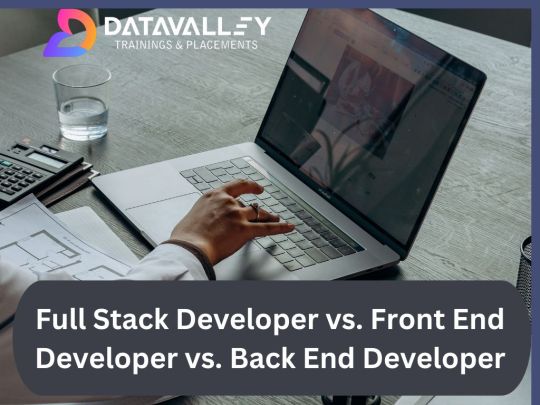
The role of a web developer is always included in the lists of high-paying IT jobs. This is because web developers are essential in today’s digital world. They create amazing websites, high-performing e-commerce sites, and other web-based applications. If you want to be a web developer, you must understand that full-stack developer skills are in great demand. However, do you understand the differences between full-stack, front-end, and back-end web development? In this post, we’ll see the differences between these three job roles, skills, and salaries.
What is Web Development?
The process of developing a website on the internet is known as web development. The non-design components of a website, such as building features and functioning with programming, markup, and scripting languages, are referred to as web development. Developers focus on technical aspects of website development such as architecture, programming, and application integration, as well as visuals.
A web developer is someone who does the following:
Creates and maintains webpages and other web-based applications.
Creates a website from a web design.
They collaborate with clients, stakeholders, and designers to understand the concept.
Can focus on frontend or backend development. Even as a full-stack developer, if necessary.
Types of Web Development
Front End Development: This aspect of web development focuses on what the user interacts with directly, i.e., the user interface of a website or web application. Front-end development deals with the design, layout, and interactivity of a site, ensuring that it’s visually appealing and user-friendly.
Back End Development: The back end is the part of a website or application that operates behind the scenes. It manages data, user authentication, and the server-side logic, ensuring the smooth functioning of the website.
Now, let’s delve into each of these roles in detail.
What is front-end development?
Front-end development, often referred to as client-side development, is the process of creating the visual elements of a website or web application that users interact with directly. It involves writing code for the user interface, optimizing website performance, and ensuring the site looks and functions correctly on various devices and browsers.
Who is a front-end developer?
A front-end developer, also known as a client-side developer, is responsible for turning web designs into a functioning website or application. They work closely with web designers and back-end developers to create an engaging and responsive user experience.
What are the front-end developer’s skills?
Front-end developers should be proficient in the following skills:
Mastery of HTML (Hypertext Markup Language) and CSS (Cascading Style Sheets) is fundamental for structuring and styling web pages.
Proficiency in JavaScript is crucial for adding interactivity and dynamic features to a website.
Knowledge of front-end frameworks like React, Angular, or Vue.js, which simplify and expedite development.
The ability to create websites that look and function well on various devices and screen sizes.
Ensuring that the website performs consistently across different browsers.
Familiarity with version control systems like Git for code management and collaboration.
Front End Developer Salary
The salary of a front-end developer can vary based on factors such as experience, location, and the company. On average, junior front-end developers can earn between $50,000 and $70,000 annually, while senior front-end developers can command salaries ranging from $90,000 to $120,000 or more.
What is Back End Development?
Back-end development, often referred to as server-side development, focuses on the server and database sides of a website or web application. It involves building and maintaining the server, databases, and applications that enable the front end to function correctly.
Who is a Back End Developer?
A back-end developer is responsible for managing the server, databases, and server-side logic of a website or application. They ensure that data is stored securely, accessed efficiently, and transmitted effectively between the front end and back end.
What are Back End Developer Skills?
Back-end developers should have expertise in the following areas:
Server-Side Programming Languages: Proficiency in languages such as Python, Ruby, Node.js, PHP, or Java is used to build server-side applications.
Databases: Knowledge of database management systems like MySQL, PostgreSQL, MongoDB, and NoSQL databases.
APIs: The ability to create and manage APIs (Application Programming Interfaces) for communication between the front end and back end.
Server Management: Skills in managing web servers and server infrastructure.
Security: Understanding web security practices and techniques to protect user data.
Version Control/Git: Proficiency in version control systems to manage and collaborate on code.
Back End Developer Salary
Back-end developer salaries can also vary based on experience, location, and the organization. Junior back-end developers can earn an annual salary ranging from $60,000 to $90,000, while senior back-end developers can expect salaries ranging from $100,000 to $150,000 or more.
Frontend vs. Backend Development
Front-end and back-end development are two halves of a whole, and they must work together seamlessly to create a functional website or application. While front-end developers focus on user interface and design, back-end developers deal with the underlying server infrastructure and data management. Both roles are essential for a successful web project.
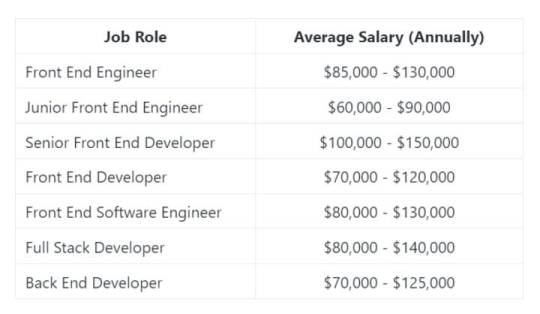
What is a Full Stack Developer?
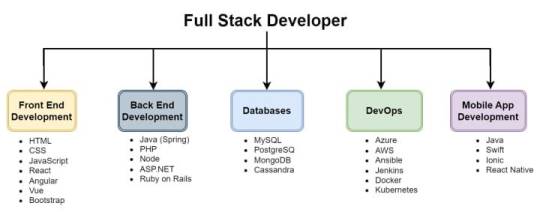
Who is a Full Stack Developer?
A full stack developer is a well-rounded professional who can take care of every aspect of web development, from designing the user interface to managing databases and server-side logic. They bridge the gap between front end and back-end development, ensuring that the entire application functions cohesively.
What are the Full Stack Developer Skills?
Full stack developers need a broad range of skills, including:
HTML/CSS: Proficiency in front end technologies for web page structuring and styling.
JavaScript: Mastery of JavaScript for creating dynamic and interactive web elements.
Front End Frameworks: Knowledge of front-end frameworks for efficient development.
Server-Side Programming Languages: Expertise in languages like Node.js, Python, Ruby, or Java for server-side development.
Databases: Proficiency in database management systems for data storage and retrieval.
APIs: Ability to create and manage APIs for communication between the front end and back end.
Version Control/Git: Familiarity with version control systems for code management.
Problem-Solving: Strong analytical and problem-solving skills to troubleshoot and optimize web applications.
Full Stack Developer Salary
Full-stack web developers are in high demand due to their range of skills and extensive knowledge. An average full stack developer’s annual salary might range from $110,000 to $150,000, based on their skill set and expertise.
Full-stack engineers earn more money than front end or back end developers. Employers agree to pay more for a full stack developer since it makes more business sense to hire one person with front and back end expertise rather than two.
As a result, the profession of a full stack developer is a profitable alternative for aspirants looking to create a career in the digital business.
The choice between becoming a full stack developer, front end developer, or back end developer depends on your interests, strengths, and career goals. Front end developers excel at creating visually appealing and user-friendly interfaces; back end developers focus on the server-side and data management; and full stack developers possess a comprehensive skill set that allows them to manage the entire development process. Each role is integral to the web development ecosystem, and the right one for you depends on your passions and aspirations within the field.
If you’re considering the path of a full stack developer and are eager to acquire the comprehensive skill set required to excel in this role, we have an excellent suggestion for you. Consider enrolling in the Full Stack Developer course at Datavalley.
Datavalley has a stellar track record of empowering aspiring developers with the knowledge and expertise to succeed in the dynamic world of web development. Their course covers everything from the fundamentals of HTML and CSS to in-depth training in JavaScript, front end and back end frameworks, and much more.
By joining Datavalley’s Full Stack Developer course, you’ll gain hands-on experience, build an impressive portfolio, and be well-prepared for a rewarding career in web development.
Don’t miss out on this opportunity to kickstart your journey as a Full Stack Developer with Datavalley. Your future in web development awaits. Take the first step today!
Attend Free Bootcamp at Datavalley
If you’re looking to supercharge your Java development skills and become a full-stack Java developer, consider joining the Java Full Stack Developer bootcamp at Datavalley. It’s an excellent opportunity to enhance your expertise and take your career to the next level.
Key points about Bootcamps:
It is completely free, and there is no obligation to complete the entire course.
20 hours total, two hours daily for two weeks.
Gain hands-on experience with tools and projects.
Explore and decide if the field or career is right for you.
Complete a mini project.
Earn a certificate to show on your profile.
No commitment is required after bootcamp.
Take another bootcamp if you are unsure about your track.
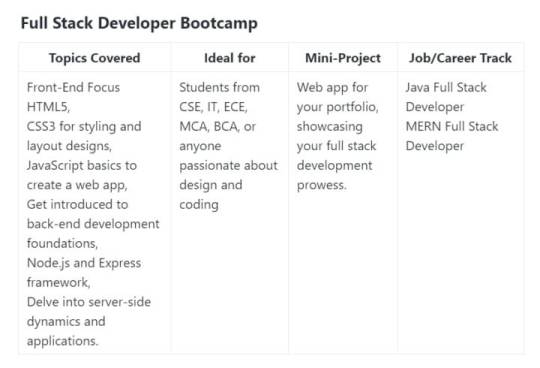
#datavalley#dataexperts#data engineering#data analytics#dataexcellence#business intelligence#data science#power bi#data analytics course#data science course#full stack course#full stack training#full stack web development#full stack developer#full stack software developer#front end developers#back end development
7 notes
·
View notes
Text
Foundations for Data Science Success: Essential Steps for Aspiring Professionals
Embarking on a journey into the world of data science is an exhilarating endeavor, promising the discovery of meaningful insights and contributions to cutting-edge advancements. However, achieving success in this dynamic field requires a robust skill set. In this article, we'll explore crucial prerequisites that will significantly enhance your prospects of securing a fulfilling position in data science.

Academic Background: Building a Solid Ground
A pivotal step in the pursuit of a data science career is cultivating the right educational foundation. Whether it's a degree in statistics, mathematics, computer science, or a specialized field like data science, acquiring foundational knowledge is crucial for comprehending the complexities of data analysis.
Programming Proficiency: Mastering the Language of Data
Proficiency in programming languages serves as a cornerstone for data science. Mastery of languages like Python and R is indispensable, given their widespread use in the field. Additionally, familiarity with essential libraries such as NumPy and pandas is vital for efficient data manipulation, a fundamental aspect of any data scientist's role.

Statistical Knowledge: Deciphering the Data Narrative
A profound grasp of statistical concepts lies at the core of data science. Understanding concepts like hypothesis testing, regression analysis, and probability theory equips data scientists with the tools needed to extract meaningful insights from intricate datasets.
Data Manipulation Skills: Crafting Clean and Usable Data
The ability to manipulate and clean data sets proficiently sets skilled data scientists apart. Learning techniques for handling missing values, addressing outliers, and utilizing tools like pandas for effective data formatting ensures that the data is in a usable state for in-depth analysis.
Data Visualization: Illuminating the Insights
Data visualization is the art of presenting complex findings in a clear and understandable manner. Familiarizing yourself with visualization tools such as Matplotlib, Seaborn, or ggplot2 enhances your capacity to communicate insights effectively, making data-driven decisions accessible to diverse audiences.
Communication Skills: Bridging the Technical Gap
Effective communication is a pivotal skill for any data scientist. The ability to convey complex findings to both technical and non-technical stakeholders is essential. Clear communication ensures that insights derived from data analysis are actionable and comprehensible across diverse teams.
Continuous Learning: Staying Ahead in a Dynamic Landscape
Data science is a swiftly evolving field with constant advancements in tools and techniques. Staying abreast of the latest trends through continuous learning is imperative. Engaging in online courses, webinars, and participating in the data science community are avenues for staying informed about industry developments.
Build a Robust Portfolio: Showcasing Your Expertise
A strong portfolio serves as your professional showcase. Showcasing real-world projects that highlight your problem-solving abilities and practical skills provides tangible evidence of your capabilities to potential employers.
In conclusion, by focusing on these essential prerequisites, you'll position yourself as a well-prepared candidate ready to navigate the intricate landscape of data science. While the journey may present challenges, a solid foundation and a commitment to continuous learning will enable you to confidently step into the dynamic and evolving world of data science, securing your first job with enthusiasm and expertise.
#data science course#datascience#technology#data science training#data science certification#tech#data analytics
2 notes
·
View notes
Text
Data Science and Analytics Courses at M S Ramaiah University: Shape Your Future Today
Advance your career with Data Science and Analytics courses at M S Ramaiah University. Our comprehensive programs cover key areas like data visualization, machine learning, statistical analysis, and big data tools. Gain hands-on experience and industry-relevant skills to excel in the data-driven world. Join M S Ramaiah University and take the first step toward becoming a data science expert!
0 notes
Text
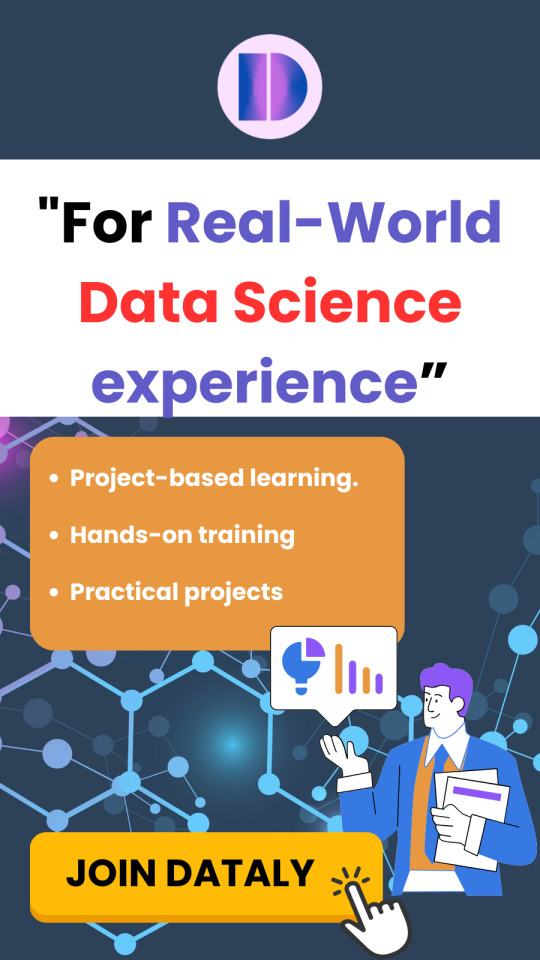
#data science course#data science training#data science certification#data science online course#data science institute in delhi#data scientist#data analytics#big data#machine learning#business intelligence#data science in canada
2 notes
·
View notes
Text
youtube
Statistics - A Full Lecture to learn Data Science (2025 Version)
Welcome to our comprehensive and free statistics tutorial (Full Lecture)! In this video, we'll explore essential tools and techniques that power data science and data analytics, helping us interpret data effectively. You'll gain a solid foundation in key statistical concepts and learn how to apply powerful statistical tests widely used in modern research and industry. From descriptive statistics to regression analysis and beyond, we'll guide you through each method's role in data-driven decision-making. Whether you're diving into machine learning, business intelligence, or academic research, this tutorial will equip you with the skills to analyze and interpret data with confidence. Let's get started!
#education#free education#technology#educate yourselves#educate yourself#data analysis#data science course#data science#data structure and algorithms#youtube#statistics for data science#statistics#economics#education system#learn data science#learn data analytics#Youtube
3 notes
·
View notes
Text
youtube
All About Data Science and Analytics Course by Imarticus Leaning | Data Science For Beginners
Looking to supercharge your career in Data Science and Analytics? Look no further! Explore the comprehensive Imarticus Postgraduate Program in Data Science & Analytics.
#Data Science and Analytics Course#Data Science#data analytics#data analyst course#data analyst training#Imarticus#data science course#Youtube
3 notes
·
View notes
Text
Is it possible to transition to a data scientist from a non-tech background at the age of 28?
Hi,
You can certainly shift to become a data scientist from a nontechnical background at 28. As a matter of fact, very many do. Most data scientists have actually shifted to this field from different academic and professional backgrounds, with some of them having changed careers even in their midlife years.

Build a Strong Foundation:
Devour some of the core knowledge about statistics, programming, and data analysis. Online classes, bootcamps—those are good and many, many convenient resources. Give it a whirl with Coursera and Lejhro for specific courses related to data science, machine learning and programming languages like Python and R.
A data scientist needs to be proficient in at least one or two programming languages. Python is the most used language for data science, for it is simple, and it has many libraries. R is another language that might come in handy for a data scientist, mostly in cases connected with statistical analysis. The study of manipulation libraries for study data and visualization tools includes Pandas for Python and Matplotlib and Seaborn for data, respectively.
Develop Analytical Skills:
The field of data science includes much analytics and statistics. Probability, hypothesis testing, regression analysis would be essential. These skills will help you derive meaningful information out of the data and also allow you to use statistical methods for real-world problems.
Practical experience is very important in the field of data science. In order to gain experience, one might work on personal projects or contribute to open-source projects in the same field. For instance, data analysis on publicly available datasets, machine learning, and creating models to solve particular problems, all these steps help to make the field more aware of skills with one's profile.
Though formal education in data science is by no means a requirement, earning a degree or certification in the discipline you are considering gives you great credibility. Many reputed universities and institutions offer courses on data science, machine learning, and analytics.
Connect with professionals in the same field: try to be part of communities around data science and attend events as well. You would be able to find these opportunities through networking and mentoring on platforms like LinkedIn, Kaggle, and local meetups. This will keep you abreast of the latest developments in this exciting area of research and help you land job opportunities while getting support.
Look out for entry-level job opportunities or internships in the field of data science; this, in effect, would be a great way to exercise your acquired experience so far. Such positions will easily expose one to a real-world problem related to data and allow seizing the occasion to develop practical skills. These might be entry-level positions, such as data analysts or junior data scientists, to begin with.
Stay Current with Industry Trends: Data science keeps on evolving with new techniques, tools, and technologies. Keep up to date with the latest trends and developments in the industry by reading blogs and research papers online and through courses.
Conclusion:
It is definitely possible to move into a data scientist role if one belongs to a non-tech profile and is eyeing this target at the age of 28. Proper approach in building the base of strong, relevant skills, gaining practical experience, and networking with industry professionals helps a lot in being successful in the transition. This is because data science as a field is more about skills and the ability to solve problems, which opens its doors to people from different backgrounds.
#bootcamp#data science course#datascience#python#big data#machinelearning#data analytics#ai#data privacy
3 notes
·
View notes
